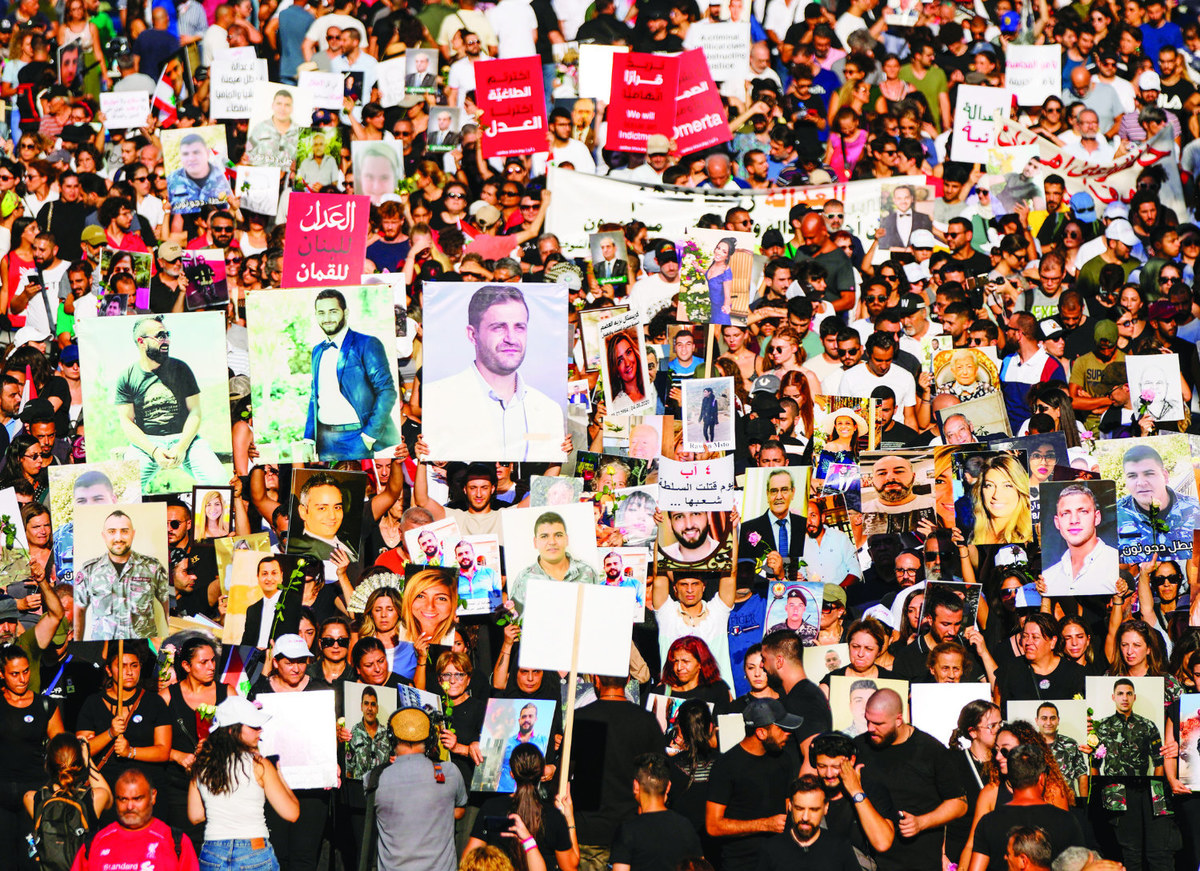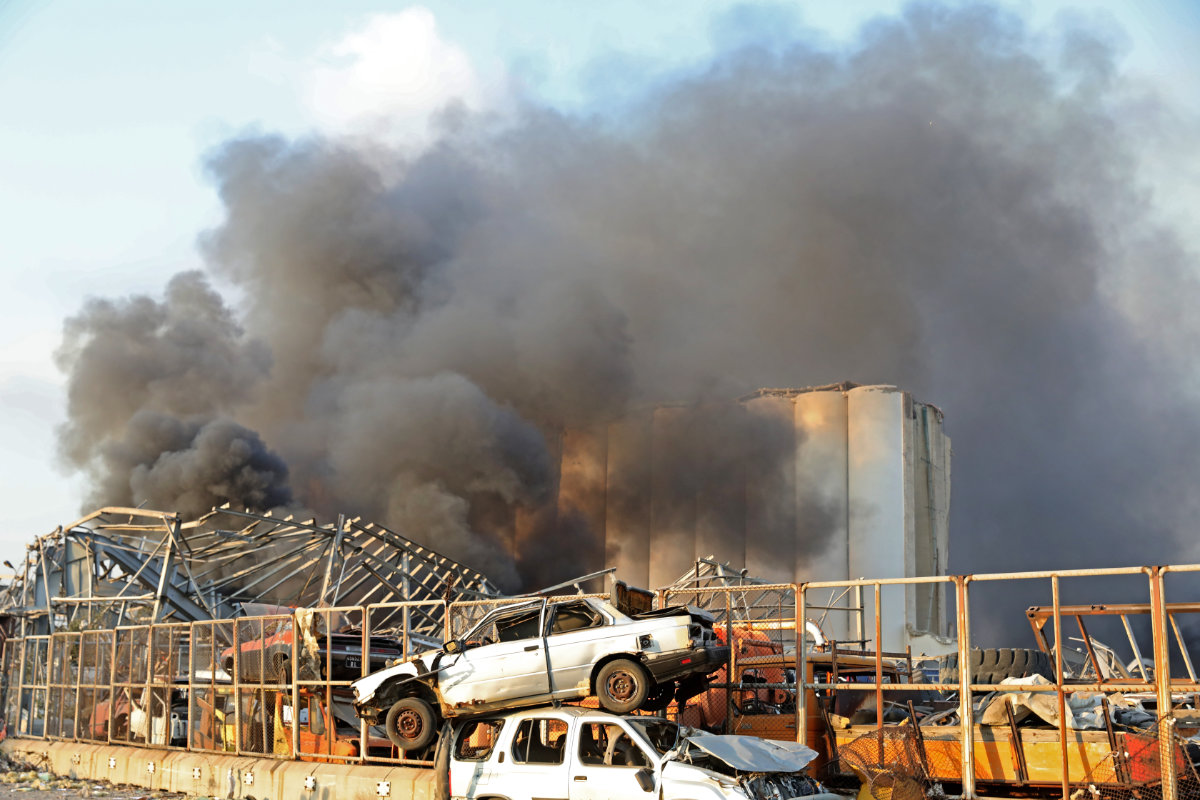BEIRUT: Lebanon on Friday mourned those killed in the port blast that devastated Beirut three years ago.
Investigations into the Aug. 4, 2020, explosion that rocked the Port of Beirut have hit a standstill.
Families of the more than 230 victims — including those who are still undergoing treatment for their injuries — are seeking answers about the tragic event and demanding accountability for it.
This year’s commemoration is fueled by the pursuit of “justice and accountability,” said William Noun, spokesperson for the families and the brother of fallen firefighter Joe Noun.
Noun was speaking at Friday’s gathering of relatives at the explosion site.

Thousands of people marched on Aug. 4, 2023, to mark the third anniversary of Beirut’s port blast, with some calling on the international community to help in the probe. (AP)
Even after the passage of three years since the crime, Noun said that the families had tenaciously kept the case alive.
Noun emphasized: “Our right to express ourselves in the way we see fit is undeniable. This issue is not limited to a few; it concerns us all.”
Victims’ families remain dedicated to their cause, considering it a tribute to the memory of their lost loved ones, the wounded, and all those affected by the explosion.
The day of mourning was marked by the closure of both public and private institutions.
Black banners were hung along roads leading to the Port of Beirut, calling on the UN for support and an “international investigation.”
Portraits of the explosion’s victims adorned walls, were worn as pins, and were carried by grieving relatives during their march.
Activists displayed images of individuals suspected of involvement in the crime at the Justice Palace in Beirut.
Among these were former ministers, current MPs, security officials, and Lebanon’s top prosecutor, Judge Ghassan Oueidat, along with other judges.
The activists have taken the initiative to advance the case in foreign courts, particularly British courts.
Their efforts have reshaped perspectives worldwide, garnering support for an international fact-finding committee.
The investigations led by judicial investigator Judge Tarek Bitar have thus far failed to produce significant results.
Judge Bitar himself has now become a defendant, facing charges of “usurping authority.”
The latest developments come amid pressure imposed by the ruling political elite, who have manipulated the judiciary to obstruct the investigation.
Friday sermons in mosques were dedicated to advocating for justice for the victims’ families.
During a mass held for the victims, Maronite Patriarch Bechara Boutros Al-Rahi endorsed the families’ plea for an international fact-finding committee to assist the judicial investigator in his pursuit of truth.
He urged an end to “political interference in the investigation.”
Al-Rahi stressed that stalled investigations did not mean the case was closed, nor that those responsible for the explosion would go unpunished.
Numerous local and international figures released statements condemning the concealment of facts.
French President Emmanuel Macron declared: “Lebanon is not alone, and it will not be alone; it can count on France.”
The French Foreign Ministry stressed in a statement the need for the Lebanese judiciary to continue the investigation with “full transparency, away from political interventions.”
As the church bells tolled and the calls to prayer echoed from the mosques in Beirut precisely at 6:07 p.m., marking the three-year anniversary of the explosion, the families of the victims were once again engulfed by profound pain.
Two processions moved toward the explosion site, one of which was led by a faction that branched off from the main assembly of families due to pressures from Hezbollah and the Amal Movement.
This breakaway group protested what they perceived as “Judge Bitar’s deviation and politicization of the investigation,” after charges were filed against former Prime Minister Hassan Diab, former ministers, current MPs, a former head of general security, and others.
Mireille, the mother of young Elias Khoury, said: “The person I was before August 2020 no longer exists. Today, I am a changed individual, merely existing — eating, drinking, and breathing — all to endure and pursue a cause that I am bound to.
“My pain is beyond words. While they carry on with their lives as if nothing happened, we bear the weight of compounded injustice.”
The families of the victims now feel more abandoned than ever before, viewing the developments within the judicial system as an attempt to close a chapter that cannot be easily closed.
Yusra Al-Amin refuses to part with the photograph of her youngest son, Ibrahim, which she keeps close to her heart day and night.
Ibrahim’s body was discovered amid the wreckage four days after the explosion by Civil Defense teams.
Al-Amin maintains her hope for justice despite the multitude of obstacles.
She visits her son’s grave daily, declaring: “I will continue to seek justice for my son until my last breath. I will never tire.”
Abdo Matta’s son, Charbel, 23, lost his life three years after joining the State Security apparatus.
Matta recounted: “Charbel wasn’t meant to be at the port that day, but he swapped shifts with a colleague and fatefully met his end.”
Hiam Qadan, who lost her 30-year-old son Ahmed, called for the perpetrators and all those involved to be held accountable.
She said: “We have the right to know who triggered the explosion that claimed our children’s lives. We will not be silenced until we unveil the identity of the murderer.
“This is our right. I lost my son six days before his birthday; he intended to migrate, but he died before he could leave.
“Where is the accountability? Where are the suspects? They released the detainees and are attempting to bury the crime. May their hearts burn as they burned our hearts.”
Rima Al-Zahed lost her brother Amin, 40, who was an employee at the Port of Beirut. She said: “The grief is immense and has yet to diminish.”
The mother added: “The entire state apparatus bears responsibility for what happened. Four security agencies were tasked with safeguarding the port’s security.
“Can we fathom a scenario in which an explosion of such magnitude occurs and no one is held accountable? Officials cover up for each other; everyone is involved. It’s a charade,” she said.
Jawad Shia, a young man of 30, tragically became a victim of the explosion just three days shy of his birthday.

A picture shows the scene of an explosion at the port in Beirut on August 4, 2020. (AFP file photo)
His father, Ajwad, recounted: “Upon graduating, he enlisted in the Lebanese army. On Aug. 4, he was stationed at the Port of Beirut. He was a polite, beloved young man and the only person I could count on in life.”
He said that the families of the victims are up against criminal gangs and murderers who evade justice.
In the third year since the explosion, there are no longer any detainees associated with the case — a stark contrast to the 17 detainees held in the preceding two years.
Among those released was Mohammed Ziad Al-Awf, head of security and safety at the Port of Beirut, who holds American citizenship.
He promptly departed for the US via Beirut Rafic Hariri International Airport immediately after being released.
On Aug. 4, 2020, an estimated 2,750 tons of ammonium nitrate, stored for years in a port warehouse, detonated due to welding activity on the structurally compromised walls.
The explosion ignited less than half of the stored material, resulting in 235 deaths, 7,000 injuries, widespread destruction, and displacement of approximately 300,000 people.
The judicial investigator conducted a simulation of the crime at the port, though the findings remain undisclosed.
The material losses from the explosion were estimated at between $3.8 billion and $4.6 billion, as per the World Bank.























